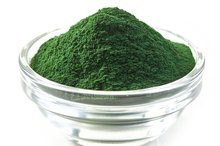Is the Aloe Vera Plant Toxic?
If you’ve ever rubbed aloe vera on a burn, then you’re familiar with the quick and often soothing relief it can provide. But aloin, which you can find in the latex of the aloe leaves, may also give the plant its laxative qualities and cause other adverse effects.
Tips
Aloe vera can be toxic in certain situations, including ingesting the aloin or yellow latex part of the plant.
According to the National Institute of Environmental Health Sciences (NIH-HHS), these adverse effects bring up concerns about aloe vera toxicity 156.
Aloe Vera Toxicity
Aloe vera is a frequently used product sold in many health food and grocery stores. When you purchase aloe vera, the National Center for Complementary and Integrative Health (NCCIH) says the clear gel and yellow latex are the two substances from aloe vera that are used in health products 26. Common uses of these substances include topically for skin conditions such as psoriasis, burns and cold sores.
You can also take aloe vera orally for bowel disease and osteoarthritis. That said, NCCIH points out that there is not enough evidence to show whether aloe vera is helpful for these purposes and many others.
Although the relative safety of the aloe vera plant is well documented, there is some concern about aloe vera toxicity related to the yellow latex, and more specifically, aloin. An April 2016 review in the Journal of Environmental Science and Health states that diarrhea, hypokalemia, pseudomelanosis coli and kidney failure are all linked to the ingestion of aloe preparations.
The review also points out that aloe vera whole leaf extract showed clear evidence of carcinogenic activity in rats, which led to classification as a possible human carcinogen by the International Agency for Research on Cancer. The Center for Science in the Public Interest also advises consumers to avoid aloe vera taken orally 4. Their recommendation? Save it for sunburns and use it topically.
Read more: Is Vitamin E Oil and Aloe Vera Good?
- Aloe vera is a frequently used product sold in many health food and grocery stores.
- An April 2016 review in the Journal of Environmental Science and Health states that diarrhea, hypokalemia, pseudomelanosis coli and kidney failure are all linked to the ingestion of aloe preparations.
Using Aloe Vera
How Is Cape Aloe Used in Medicine?
Learn More
If you have an aloe vera plant at home and you have pets, there are some things you should know about the potential for aloe vera toxicity. According to the American Society for the Prevention of Cruelty to Animals, aloe vera is toxic to dogs, cats and horses, with the toxic principles being saponins and anthraquinones 3.
The warning signs include lethargy and diarrhea in all three animals and vomiting in dogs and cats. Additionally, if you use glucose-lowering medication for diabetes, the NCCIH says to be cautious of taking aloe orally since it may lower blood glucose levels.
The most important thing to remember when using an aloe vera plant is to avoid the part that contains aloin, which you can find in the skin of the aloe vera plant. In other words, don’t just eat a raw aloe leaf or whole leaf aloe extract.
Read more: What Are the Benefits of Eating Aloe Vera?
Instead, use the clear gel or topical version for topical applications, which the NCCIH says is likely to be safest route. When it comes to the broader use of the topical version of aloe vera gel, the World Health Organization (WHO) says the use of aloe vera gel is found most often in external treatment of minor wounds and inflammatory skin disorders 6. Consumers are most familiar with the gels used in liquids, creams, sun lotions, healing ointments, and other skin-care products.
As with any over-the-counter remedy, consider talking with your doctor prior to using the product. If you have any concerns about safety or aloe vera toxicity, make an appointment with a dermatologist or your physician for guidance on how to use aloe vera gel.
- If you have an aloe vera plant at home and you have pets, there are some things you should know about the potential for aloe vera toxicity.
- Additionally, if you use glucose-lowering medication for diabetes, the NCCIH says to be cautious of taking aloe orally since it may lower blood glucose levels.
Related Articles
References
- Journal of Environmental Science and Health: "Aloe Vera: A Review of Toxicity and Adverse Clinical Effects"
- National Center for Complementary and Integrative Health: "Aloe Vera"
- The American Society for the Prevention of Animal Cruelty: "Aloe"
- National Institute of Environmental Health Sciences: "Aloe Vera"
- The World Health Organization: "Aloe Vera Gel"
- Dat, A.; Poon, F.; Pham, K. et al. Aloe vera for treating acute and chronic wounds. Cochrane Database Syst Rev. 2012 Feb 15;(2):CD008762. DOI: 10.1002/14651858.CD008762.pub2.
- Haddad, P.; Amouzgar-Hashemi, F.; Samsami, S. et al. Aloe Vera for Prevention of Radiation-Induced Dermatitis: a Self-Controlled Clinical Trial. Curr Oncol. 2013 Aug;20(4):e345-8. DOI: 10.3747/co.20.1356.
- Heggie, S.; Bryant, G.; Tripcony, L. et al. A Phase III Study on the Efficacy of Topical Aloe Vera Gel on Irradiated Breast Tissue. Cancer Nurs. 2002;25(6):442-51.
- Langmead, L.; Feakins, R.; Goldthorpe, S.et al. Randomized, Double-blind, Placebo-controlled Trial of Oral Aloe Vera Gel for Active Ulcerative Colitis. Aliment Pharmacol Ther. 2004;19(7):739-47. DOI: 10.1111/j.1365-2036.2004.01902.x.
- Paulsen, E.; Korsholm, L.; and Brandrup, F. Double-blind, Placebo-Controlled Study of a Commercial Aloe Vera Gel in the Treatment of Slight to Moderate Psoriasis Vulgaris. J Eur Acad Dermatol Venereol. 2005:19(3):326-31. DOI: 10.1111/j.1468-3083.2004.01186.x.
- Suksomboon, N.; Poolsup, N.; Punthanitisarn, S. et al. Effect of Aloe vera on glycaemic control in prediabetes and type 2 diabetes: a systematic review and meta‐analysis. J Clin Pharm Ther. 2016;41(2):180-8. DOI: 10.1111/jcpt.12382
- Zhang, Y.; Liu, W.; Liu, D. et al. Efficacy of Aloe Vera Supplementation on Prediabetes and Early Non-Treated Diabetic Patients: A Systematic Review and Meta-Analysis of Randomized Controlled Trials. Nutrients. 2016 Jul; 8(7): 388. DOI: 10.3390/nu8070388.
Writer Bio
Sara Lindberg, B.S., M.Ed., is a freelance health and fitness writer. She holds a Bachelor’s of Science degree in exercise science and a Master's degree in counseling. She’s spent her life educating people on the importance of health, wellness, mindset and mental health. She specializes in the mind-body connection, with a focus on how our mental and emotional wellbeing impact our physical fitness and health.









